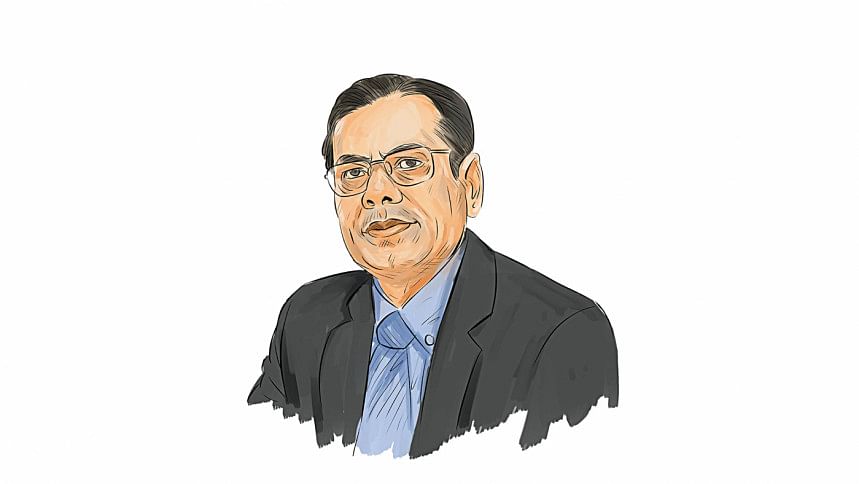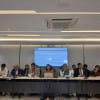Govt not using full strength to restore macroeconomic stability

The government is not moving at full throttle in bringing discipline to the banking sector, implementing reforms wholeheartedly, taking measures against syndication, and bringing money launderers under the rule of law, said a top economist.
Mustafizur Rahman, a distinguished fellow at the Centre for Policy Dialogue (CPD), said the government is taking various steps and embracing reforms to mitigate challenges in the economy and lower inflation.
"My concern is that they are not going at full strength. They are going one step forward, two steps backward," he added.
"I see half-hearted initiatives, but taking the steps to its logical conclusion is not there because that will hurt a number of people. Whether it will harm those people is at the end of the day a political decision."
According to Rahman, macroeconomic management, good governance, reforms, and zero tolerance to all forms of anomalies will be required if the upcoming budget is to achieve its objective of macroeconomic stability and bringing down inflation.
The former professor of accounting said the budget should look at the pressure heaped on marginalised groups, fixed-income groups and low-income people, and how they can be helped through budgetary allocations, fiscal policies and fiscal incentives.
He requested the government go a bit slow on transport infrastructure. However, the priority should be to complete ongoing projects rather than taking up new ones.

In rural areas, the family card programme needs to be expanded and entitlements should be strengthened. In urban areas, the government should think about introducing urban rationing for workers.
Since children are becoming a major victim of the ongoing macroeconomic problems, Prof Rahman called for launching a midday meal at schools to strengthen their nutrition intake.
Also, there should be renewed effort to enhance the country's revenue-GDP ratio, which is one of the lowest in the world.
He thinks digitalisation of the taxation system could be a major initiative that this budget could take and allocate money for both human resource development and technological upgradation of the National Board of Revenue.
He said almost the entire annual development programme is being financed from borrowed money. The burden of debt servicing is increasing.
"As a result, we are ending up in a situation where we are borrowing in order to pay the borrowed money. This is unsustainable."
The government should not take much money from the banking sector to meet the budget deficit as it could crowd out the private sector. A large part of it should be financed through external sources.
This is because in the case of borrowing from domestic sources, the interest payments have gone up quite significantly, from 9 percent to 14 percent.
Prof Rahman also says there might be natural contraction in demand for investable resources by the private sector because the costs have gone up. If the private sector demand for credit comes down, it will have a knock-on effect on private sector investment.
In Bangladesh, private sector investments have stagnated at 23 percent to 24 percent of the GDP over the last few years.
Prof Rahman said the interest rate is only one component of the cost of an entrepreneur. There are many other components, including the transport cost, cost of doing business and interaction with various government institutions.
If these cannot be strengthened and the costs decreased, obviously entrepreneurs, both domestic-oriented and export-oriented, will lose their competitiveness.
The good side is that because of the significant depreciation of the taka, the export sector has regained some competitiveness. If a conducive business environment is not there, the depreciation advantage will not translate into a competitive advantage.
He said the management of the supply chains is very weak and many of these supply chains have been overtaken by various corporate houses. And many of the inputs are controlled by only a few.
The government needs to see whether there are barriers to entry for import of rice or anything, he said.
He said in other countries, institutions like the commerce ministry, the consumer rights department, and the competition commission do the monitoring, surveillance and market control.
Sometimes, the supply from the government will stop in order to stabilise the market and sometimes they will go for open market sale.
"All of these should be done in an evidence-based manner and in a forward-looking manner. Imports should be done in a foreign-looking manner," the economist said.
The banking sector has been facing major problems and the measures aimed at bringing them down seem to be taking it one step forward, two steps backward.
"Good governance is essential in terms of not only ensuring value for money but also tackling the current challenges."
"At the end of the day, these are political decisions."
"Often, we hear about zero tolerance against this type of anomalies. But on the other hand, we also see contradictory steps: people are not paying taxes and taking money outside. But in the budget, they are given various incentives."
He said some are paying 30 percent in income tax while others are not paying anything and then they are allowed to whiten the money at 7 percent.
"So, this type of contradictory signal is not good for the economy."
He said it is time now to gradually phase out the 2.5 percent incentive given to remitters since the taka has depreciated by more than 35 percent in the past two years.
He said predictability should be given to entrepreneurs so they know how long they would continue to enjoy it and when it will be discontinued.
Imports are being made at Tk 117 per USD against Tk 86 two years ago.
Obviously, this will have a knock-on effect on investment, employment and the purchasing power of the common people, he said.
"It remains to be seen how to bring back money that has been laundered and break the syndication in the supply chain," he added.


 For all latest news, follow The Daily Star's Google News channel.
For all latest news, follow The Daily Star's Google News channel. 








Comments